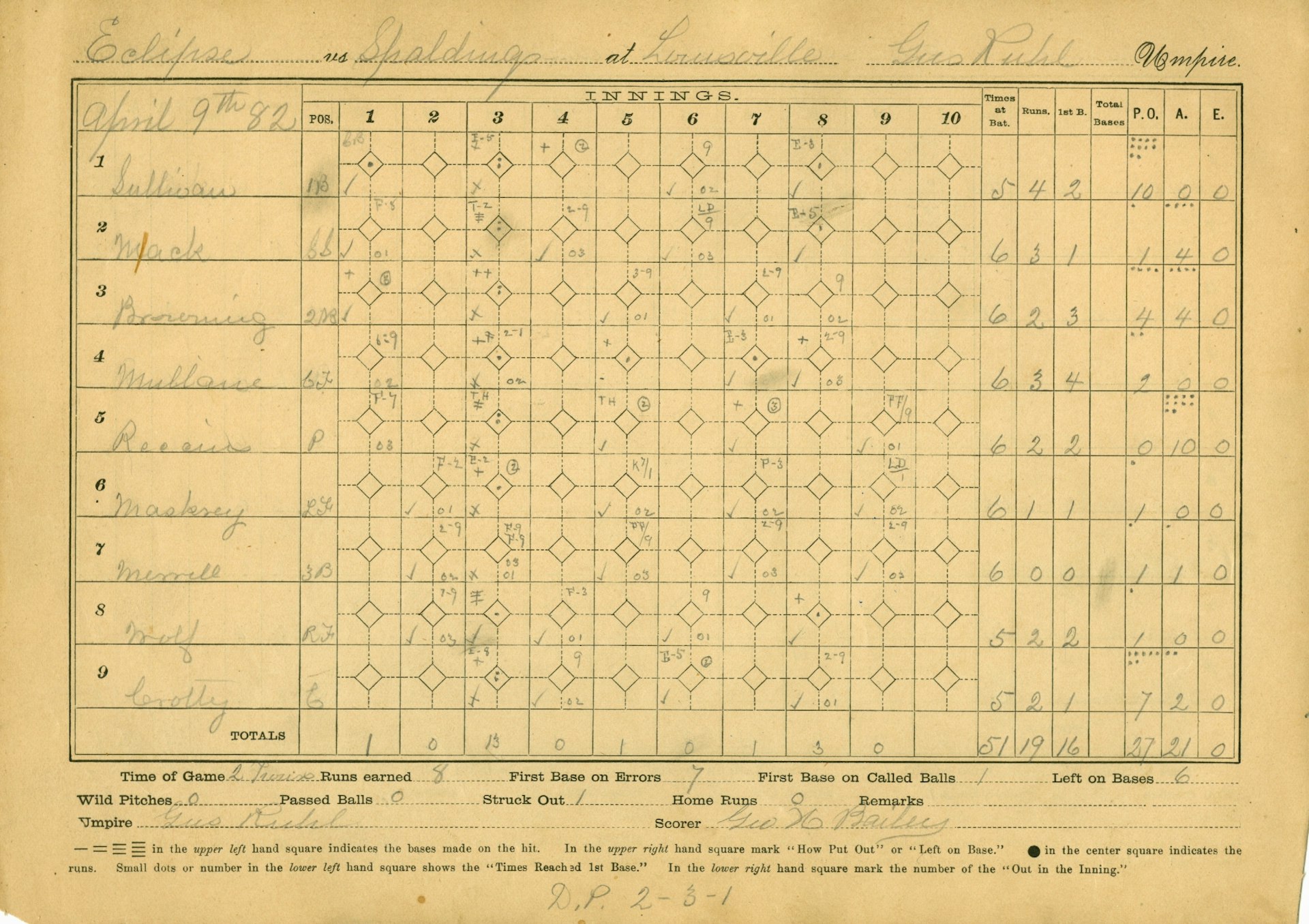Eclipses: Celestial Events, Racehorses, and Louisville Baseball
By: Bailey Mazik, Curatorial Specialist
It seems like all of Louisville is buzzing with anticipation for the solar eclipse and Louisville Slugger Museum & Factory is no exception! For me “eclipse” summons images and tales of the semi-professional team that played in West Louisville, and the fantastic 1880s Eclipse scorebooks in our museum’s collection.
These scorebooks were donated to the museum in 2015 by descendants of the Reccius family, who has been called The First Family of Louisville Baseball. Phil and John Reccius played for Louisville baseball teams in the early 1880s and their brother Bill was a co-founder and co-owner of the Louisville Eclipse team. And in studying these books I’ve wondered why and how the Eclipse got its name in the first place. It’s a bit unusual for a mascot, isn’t it? It isn’t an animal, a character, an article of clothing, or even a color – all of which were common names for teams, then and now.
Below is a picture of the 1882 Louisville Eclipse team. The players are as follows: first row (left to right): John Reccius, William Van Winkle Wolf. Second row (left to right): Dan Sullivan, Denny Mack, Guy Hecker. Third row (left to right): Leech Maskery, Pete Browning, Tony Mullane, Bill Schenk and John Strick.

I’ve found one prevailing thread of explanation for the Eclipse name, which, unsurprisingly for Kentucky, relates to racehorses. The original Eclipse athlete was an undefeated racehorse from England in the late 1700s. He was born during the eclipse of 1764 and his lineage is still present in most Thoroughbreds today. An American racehorse of the same name took the racing world by storm in the early-mid 1800s and was finally retired to Kentucky in 1837. It isn’t much of a stretch to say that the term eclipse in this time and region was associated with sporting excellence, and the Louisville Eclipse baseball team certainly excelled.
And the nicknames of the players are commendable, too. A closer look at the 1882-1884 rosters provides some chuckles as well as puzzlement. One of my favorites is Chicken Wolf. The Louisville native William Wolf defied the advice to eat a light meal before games and instead indulged in a hefty stewed chicken dinner. The cause of his drowsiness eventually came to light, which apparently humored his teammates including Pete Browning, who supposedly bestowed him as “Chicken.”
Pete Browning (see picture below) is fondly remembered as the “Louisville Slugger” and “Gladiator” due to his large build and hard hitting swing. George “Jumbo/Juice” Latham was known for his high energy while the Ireland native Thomas “Sleeper” Sullivan was teased for not knowing what a Pullman Sleeper Car was.


Some more obvious nicknames include Charles “Pop” Smith was an older guy on the field as he had a good, long career and “Move Up Joe” Gerhardt was an early advocate of bunting in addition to being a great second baseman.
I very unfortunately didn’t find the reasoning behind Ri “Angel Sleeves” Jones. And I can’t leave out my favorite real name of them all, that of the scorekeeper: George Bailey. Sixty-some years prior to the now ever popular and beloved It’s a Wonderful Life movie character portrayed by Jimmy Stewart, George Bailey was keeping diligent score for the Louisville Eclipse and later went on to be assistant manager for the Milwaukee Brewers.
Check out this scorebook page from April 9, 1882. Note players Sullivan, Browning, and Wolf as well as scorer Geo. Bailey:


As you can see in the scorebook page below, on June 26, 1881, Tony “The Apollo of the Box” Mullane and Fred “Dandelion” Pfeffer put up a good fight for 19 innings! The team from Akron, Ohio ventured down to Louisville for a series of games. Much like the Eclipse, the Akrons was a respected “non-league” team nationwide which made their match-up especially exciting. The Sunday game was the conclusion of a four-game series in which Akron had won two of the three preceding games, tarnishing the Eclipse’s undefeated season.
Nonetheless, that Sunday game did not disappoint. The game’s tight race is credited to two pitchers: Akrons’ Mullane and Eclipse’s John Reccius. Louisville’s Pfeffer also put up a good fight at second base. And what started as a solid back and forth tug of war for runs ended in a tie when the game was wrapped due to darkness.
Tie games were as unsatisfying then as they are today and a fifth game was set up for the day after the 19-inning game. Maybe the Eclipse guys were tired and maybe they also had a case of the Mondays because they lost that final game (14-5) along with the series to Akron.
Scan of scorebook page from the June 26, 1881 game:

As the ever-popular Shakespearian quote claims of names and titles: “What's in a name? That which we call a rose by any other name would smell as sweet.” I love studying the Louisville Eclipse team, reading of its accomplishments and the players’ comradery, as evidenced by the nicknames. They will likely continue to make folks squint their eyes in fascination as they read of the 19-inning game played by Chicken Wolf and Gladiator Browning and may we all cherish this 2017 total solar eclipse, counting it among many great Kentucky eclipses.
Editor’s note:
From Aug. 19-21st we’re offering a Moonshot BOGO with buy one, get one free admission all day long, and the first 148 guests each day receive a free special edition solar eclipse mini-bat!
